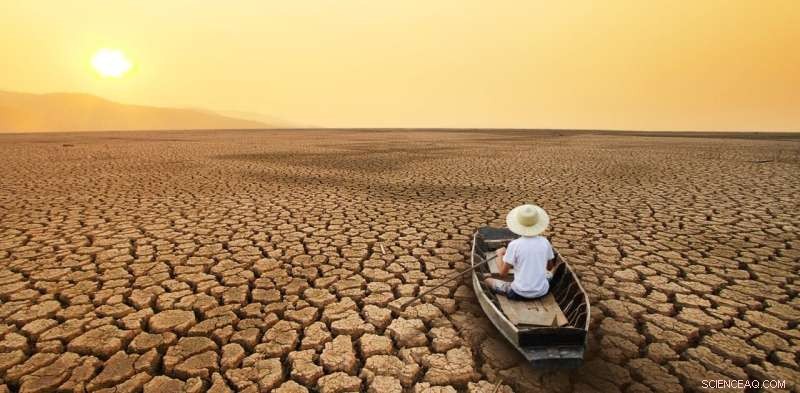Como a política, não as mudanças climáticas, é responsável por desastres e conflitos

Crédito:Piyaset / shutterstock
O último relatório da ONU sobre os potenciais impactos das mudanças climáticas dá um veredicto sombrio, com alguns efeitos agora considerados inevitáveis. Mas também há lições sobre desastres e conflitos violentos que podem ajudar a salvar vidas e criar sociedades mais seguras, independentemente das mudanças climáticas causadas pelo homem.
O principal texto disponível do relatório do Painel Intergovernamental sobre Mudanças Climáticas (IPCC) sobre "Impactos, Adaptação e Vulnerabilidade" é um Resumo de 35 páginas para Formuladores de Políticas, que pelas regras do IPCC, é aprovado pelos governos dos estados membros.
Os cientistas do IPCC são nomeados pelos estados membros e esses pesquisadores contribuintes não produzem ciência nova. Eles resumem as dezenas de milhares de artigos científicos revisados por pares sobre mudanças climáticas desde a avaliação anterior (o último grande relatório do IPCC sobre impactos, adaptação e vulnerabilidades foi publicado em 2014).
Os cientistas então recebem milhares de comentários de revisão em rascunhos que exigem revisões textuais ou respostas. Ao fazer uma série de declarações sobre nossa compreensão das mudanças climáticas, o relatório atribui níveis de confiança como "baixo" ou "muito alto" para indicar o quanto os autores estão certos de cada um.
O relatório atual foi ofuscado por cientistas ucranianos que tiveram que deixar a sessão de aprovação para cuidar de si mesmos e de suas famílias durante a invasão russa de seu país. No entanto, cerca de 90 cientistas de todos os continentes habitados e equilibrados entre mulheres e homens redigiram o documento. Como ocorre com frequência, surgiram relatos de pressões políticas para remover conteúdo científico que enfatiza a natureza política do material.
Desastres e mudanças climáticas Como acadêmico que pesquisa desastres e saúde, fiquei particularmente interessado em como o relatório examinava as mudanças climáticas como causa de desastres, incluindo conflitos violentos, e definia ações para evitá-los.
O resumo do IPCC evita inteiramente a expressão "desastre natural". Isso reflete décadas de trabalho explicando que os desastres são causados por fontes de vulnerabilidade – como acesso desigual e desigual a serviços essenciais, como saúde ou infraestrutura mal projetada ou construída, como usinas de energia – e não pelo clima ou outras influências ambientais.
O relatório afirma, com grande confiança, que “as mudanças climáticas estão contribuindo para crises humanitárias onde os riscos climáticos interagem com alta vulnerabilidade”. Em outras palavras, a vulnerabilidade deve existir antes que uma crise possa surgir. A mudança climática não é a causa raiz do desastre. O relatório explica que lugares com “pobreza, desafios de governança e acesso limitado a serviços e recursos básicos, conflitos violentos e altos níveis de meios de subsistência sensíveis ao clima” são mais vulneráveis aos impactos das mudanças climáticas.

Mozambique is one of the world’s most vulnerable countries, according to the Climate Risk Index. Credit:fivepointsix / shutterstock
For example, cyclones still lead to disasters in Bangladesh. Nevertheless, the country has substantially reduced deaths and damage through concerted efforts to reduce vulnerabilities. These include building thousands of storm shelters and issuing early warnings by multiple means. These measures have made cyclones less deadly even as the storms have become more intense due to climate change.
Weather disasters which kill more people tend to occur where communities and infrastructure are more vulnerable, according to the report. Heat is rightly highlighted as a major concern, since it causes crops to fail and forces people to halt work. That said, it is surprising that the health impacts of humidity, which can combine with extreme heat to deadly effect, are not mentioned.
The report explains that disaster risk and impacts can be reduced by tackling fundamental issues which cause vulnerability, no matter what the weather and climate do. It places high confidence in risk management, risk sharing, and warning strategies as key tasks for adapting to climate change.
Violent conflict and climate change As with disasters, the report cannot attribute violent conflict to climate change. With high confidence, the report states that "compared to other socioeconomic factors the influence of climate on conflict is assessed as relatively weak." This corroborates other research which argues peace and conflict are more determined by social and political factors than by climate or weather.
The authors identify, with high confidence, actions to reduce the "underlying vulnerabilities" which raise the risk of violent conflict. These can be based on research and might include redistributing wealth and resources to make societies more equal and equitable, while providing diverse livelihoods. Adapting to climate change is only part of the solution. Scientific analyses note how development, rather than climate change adaptation only, is the most effective overall.
In fact, despite frequent assumptions that climate change caused or was linked to violent conflicts in the past, the summary implies that no single conflict should be attributed to climate change, natural or anthropogenic. This conclusion matches analyses for Darfur in 2003 and Syria in 2011.
Summary of the summary The IPCC's press release on the new report was headlined "Climate change:a threat to human wellbeing and health of the planet." Its stark opening detailed "dangerous and widespread disruption." Yet its subtitle, "Taking action now can secure our future," needs emphasizing. This is particularly the case for disasters and violent conflicts which, the summary document states with high confidence, are not significantly influenced by human-caused climate change.
Perhaps the press release mentions neither disasters nor violent conflict because they represent comparatively positive news among the bleakness. Ultimately, "taking action now" means applying the science of disasters and conflict for prevention. Then, we save lives and livelihoods, no matter what climate change does.

